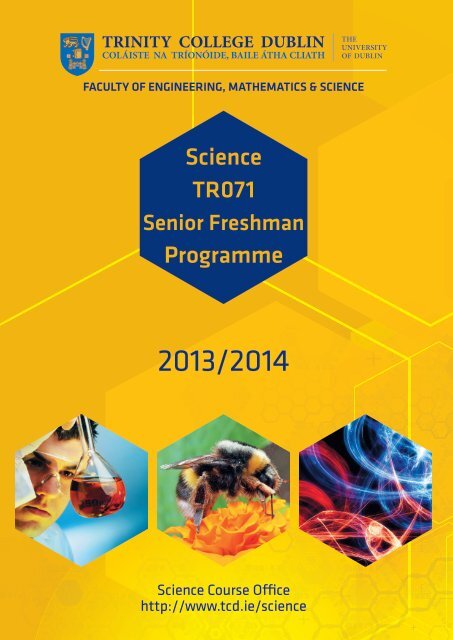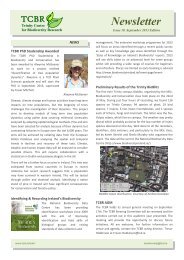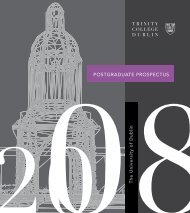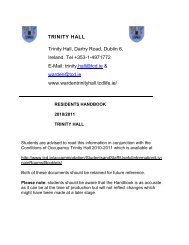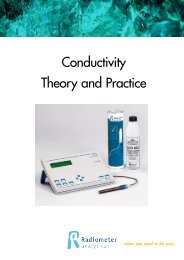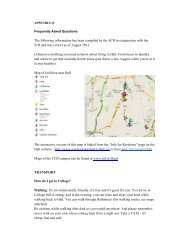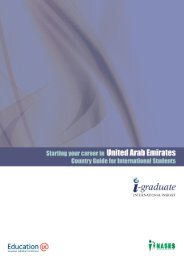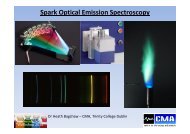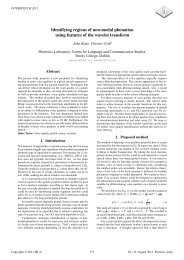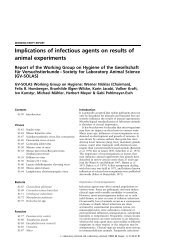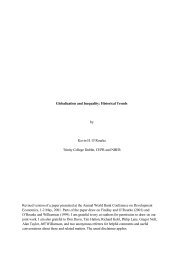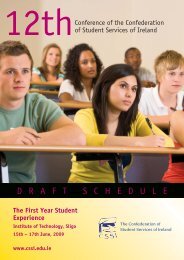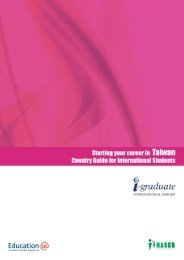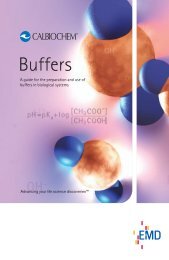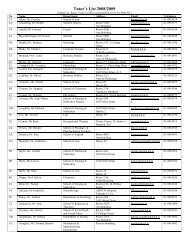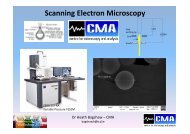Senior Freshman Programme 2013/2014 - Trinity College Dublin
Senior Freshman Programme 2013/2014 - Trinity College Dublin
Senior Freshman Programme 2013/2014 - Trinity College Dublin
Create successful ePaper yourself
Turn your PDF publications into a flip-book with our unique Google optimized e-Paper software.
FACULTY OF ENGINEERING, MATHEMATICS & SCIENCE<br />
Science<br />
TR071<br />
<strong>Senior</strong> <strong>Freshman</strong><br />
<strong>Programme</strong><br />
<strong>2013</strong>/<strong>2014</strong><br />
Science Course Office<br />
http://www.tcd.ie/science
This handbook applies to all students taking TR071 Science. It<br />
provides a guide to what is expected of you on this programme, and<br />
the academic and personal support available to you. Please retain<br />
for future reference.<br />
The information provided in this handbook is accurate at time of<br />
preparation. Any necessary revisions will be notified to students via<br />
email and the Science Course Office website<br />
(http://www.tcd.ie/Science). Please note that, in the event of any<br />
conflict or inconsistency between the General Regulations published<br />
in the University Calendar and information contained in the course<br />
handbooks, the provisions of the General Regulations will apply.<br />
Produced by:<br />
The Science Course Office<br />
<strong>Trinity</strong> <strong>College</strong><br />
<strong>Dublin</strong> 2<br />
Tel: +353 1 896 1970/896 2829<br />
Web address: http://www.tcd.ie/Science/<br />
Edited by: Ms Anne O’Reilly and Ms Ann Marie Brady<br />
http://www.tcd.ie/Science
Index<br />
Page<br />
<strong>Senior</strong> <strong>Freshman</strong> Science TR071 Introduction 1<br />
Course Overview 2<br />
<strong>Senior</strong> <strong>Freshman</strong> modules 3<br />
<strong>Senior</strong> <strong>Freshman</strong> modules by semester 4<br />
<strong>Senior</strong> <strong>Freshman</strong> patterns 5<br />
<strong>Senior</strong> <strong>Freshman</strong> module requirements 7<br />
Table of Prerequisites for Moderatorship 8<br />
Biology 9<br />
Chemistry 17<br />
Geography 20<br />
Geology 22<br />
Mathematics 24<br />
Physics 25<br />
<strong>Senior</strong> <strong>Freshman</strong> examination regulations 28<br />
Attendance regulations 30<br />
Non-Satisfactory attendance and course work regulations 30<br />
Plagiarism regulations 30<br />
Tutorial Services information 32<br />
Disability Services information 33<br />
Student Counselling Service information 33<br />
Draft Semester one timetable 34<br />
Draft Semester two timetable 35<br />
Dates to note 36<br />
Science Course Office contact details 37<br />
http://www.tcd.ie/Science
<strong>Senior</strong> <strong>Freshman</strong> Science TR071 – Introduction<br />
The purpose of this booklet is to provide information on subjects<br />
and modules that will be available in the <strong>Senior</strong> <strong>Freshman</strong> Year.<br />
The <strong>Senior</strong> <strong>Freshman</strong> year will build on the material covered in the<br />
Junior <strong>Freshman</strong> year which will help decide on the career path to<br />
follow.<br />
The modules chosen in the Junior <strong>Freshman</strong> and <strong>Senior</strong> <strong>Freshman</strong><br />
years will determine the Moderatorship(s) for which students are<br />
qualified. Reading this booklet carefully ensures that students are<br />
aware of the Moderatorship pre-requisites and the module<br />
requirements before making choices. Should students wish to<br />
discuss their options please call into the Science Course and we will<br />
do our best to help.<br />
I wish you well for the coming year.<br />
Professor Graeme Watson<br />
Science Course Director<br />
1
<strong>Senior</strong> <strong>Freshman</strong> Science TR071 Course Overview<br />
In the <strong>Senior</strong> <strong>Freshman</strong> year students will select modules to a total of 60<br />
credits (30 from each semester) from the following subject areas:<br />
• Biology<br />
• Chemistry<br />
• Geography<br />
• Geology<br />
• Mathematics<br />
• Physics<br />
The <strong>Senior</strong> <strong>Freshman</strong> year is divided into Semester 1 (Michaelmas term)<br />
and Semester 2 (Hilary term) and you must select modules to the value of<br />
60 credits for the year with no more than 30 credits from Semester 1 and<br />
30 credits from Semester 2, following one of the four patterns shown on<br />
pages 5 and 6.<br />
When choosing modules for the <strong>Senior</strong> <strong>Freshman</strong> year you must take into<br />
account:<br />
• Module requirements,<br />
o for example: If you are taking BY2209 you must also take<br />
BY2201 and BY2205<br />
• If you are taking PY2P10 & PY2P20 you must also take<br />
MA22S1, MA22S2, MA22S3 and MA22S4 (full details of<br />
Module requirements are on page 7 of this booklet)<br />
• Moderatorship pre-requisites,<br />
o for example: If you wish to compete for a place in<br />
Biochemistry you must take BY2201, BY2203, BY2205 and<br />
BY2208 (full details of Moderatorship pre-requisites are on<br />
page 8 of this booklet)<br />
Confirm your modules by ticking a box against the modules of your choice<br />
in the online form and submit the form no later than Thursday 4 th April<br />
<strong>2013</strong>.<br />
SF subject choice forms are available online:<br />
https://www.tcd.ie/Science/local/undergraduate-students/sf/<br />
If you wish to change your mind before term begins in September <strong>2013</strong>,<br />
you can resubmit the online form with a subject line of "change of module<br />
choice" and a note in the form specifying "change of module choice.<br />
Students can apply to change their second semester module<br />
choices up to the end of the first semester by calling into the<br />
Science Course Office.<br />
If you need help with your selection, please do not hesitate to call<br />
into the Science Course Office.<br />
2
The <strong>Senior</strong> <strong>Freshman</strong> year consists of the following:<br />
Subject Modules Credits<br />
BY2201: Cell Structure and Function 5<br />
BY2202: Vertebrate Form and Function 5<br />
BY2203: Metabolism 5<br />
BY2204: Evolution 5<br />
BIOLOGY<br />
BY2205: Microbiology 5<br />
BY2206: Ecosystem Biology and Global Change 5<br />
BY2207: Behaviour 5<br />
BY2208: Genetics 5<br />
BY2209: Infection and Immunity 5<br />
BY2210: Agriculture, Environment and<br />
Biotechnology<br />
5<br />
CHEMISTRY<br />
GEOGRAPHY<br />
GEOLOGY<br />
CH2201: Chemistry Semester 1 10<br />
CH2202: Chemistry Semester 2 10<br />
GG2024: Physical Geography: Changing<br />
Environments<br />
GG2025: Human Geography: Changing Worlds 10<br />
GL2205:The Dynamic Earth 1: rocks and evolution 10<br />
GL2206:The Dynamic Earth 2: structure and<br />
microscopy<br />
MA22S1: Multivariable calculus for Science 5<br />
10<br />
10<br />
MA22S2: Vector calculus for Science 5<br />
MATHEMATICS<br />
MA22S3: Fourier analysis for Science 5<br />
MA22S4: Mechanics 5<br />
MA22S6: Numerical Data analysis techniques 5<br />
PHYSICS<br />
PY2P10: Classical Physics 10<br />
PY2P20: Modern Physics 10<br />
3
TR071 Modules and Semesters<br />
SEMESTER ONE<br />
(Michaelmas Term)<br />
(29/9/<strong>2013</strong> - 13/12/<strong>2013</strong>)<br />
Subject Modules Credits<br />
BY2201: Cell Structure and Function 5<br />
Biology<br />
BY2202: Vertebrate Form and Function 5<br />
BY2203: Metabolism 5<br />
BY2204: Evolution 5<br />
Chemistry CH2201: Chemistry Semester 1 10<br />
Geography GG2024: Physical Geography: Changing Environments 10<br />
Geology GL2205: The Dynamic Earth: rocks and evolution 10<br />
Maths<br />
MA22S1: Multivariable calculus for Science 5<br />
MA22S3: Fourier analysis for Science 5<br />
Physics PY2P10: Classical Physics 10<br />
SEMESTER TWO<br />
(Hilary Term)<br />
(13/01/<strong>2014</strong> - 04/04/<strong>2014</strong>)<br />
Subject Modules Credits<br />
BY2205: Microbiology 5<br />
BY2206: Ecosystem Biology and Global Change 5<br />
Biology<br />
BY2207: Behaviour 5<br />
BY2208: Genetics 5<br />
BY2209: Infection and Immunity 5<br />
BY2210: Agriculture, Environment and Biotechnology 5<br />
Chemistry CH2202: Chemistry Semester 2 10<br />
Geography GG2025: Human Geography: Changing Worlds 10<br />
Geology GL2206: The Dynamic Earth: structure and microscopy 10<br />
MA22S2: Vector calculus for Science 5<br />
Maths<br />
MA22S4: Mechanics 5<br />
MA22S6: Numerical Data analysis techniques 5<br />
Physics PY2P20: Modern Physics 10<br />
4
PATTERN 1<br />
<strong>Senior</strong> <strong>Freshman</strong> Science Patterns <strong>2013</strong>-14<br />
SEMESTER 1 (Michaelmas Term)<br />
PY2P10<br />
SEMESTER 2 (Hilary Term)<br />
PY2P20<br />
MA22S1 MA22S3 MA22S2 MA22S4<br />
MA22S6<br />
40 credits of Physics and Maths combined plus 20 additional credits<br />
(10 from each Semester) from the following:<br />
CH2201<br />
GL2205<br />
GG2024<br />
CH2202<br />
GL2206<br />
GG2025<br />
BY2201 BY2203 BY2205 BY2208<br />
BY2202 BY2204 BY2206 BY2209<br />
BY2207<br />
BY2210<br />
PATTERN 2<br />
SEMESTER 1 (Michaelmas term)<br />
CH2201<br />
SEMESTER 2 (Hilary term)<br />
CH2202<br />
20 credits of Chemistry (both modules) plus 40 additional credits<br />
(20 from each Semester) from the following:<br />
MA22S1 MA22S3 MA22S2 MA22S4<br />
MA22S6<br />
GL2205<br />
GG2024<br />
GL2206<br />
GG2025<br />
BY2201 BY2203 BY2205 BY2208<br />
BY2202 BY2204 BY2206 BY2209<br />
BY2207<br />
BY2210<br />
5
<strong>Senior</strong> <strong>Freshman</strong> Science Patterns <strong>2013</strong>-14: continued<br />
PATTERN 3<br />
SEMESTER 1 (Michaelmas Term)<br />
GL2205<br />
SEMESTER 2 (Hilary Term)<br />
GL2206<br />
20 credits of Geology (all modules) plus 40 additional credits<br />
(20 from each Semester) from the following:<br />
MA22S1 MA22S3 MA22S3 MA22S4<br />
MA22S6<br />
CH2201<br />
GG2024<br />
CH2202<br />
GG2025<br />
BY2201 BY2203 BY2205 BY2208<br />
BY2202 BY2204 BY2206 BY2209<br />
BY2207<br />
BY2210<br />
PATTERN 4<br />
SEMESTER 1 (Michaelmas Term)<br />
GG2024<br />
SEMESTER 2 (Hilary Term)<br />
GG2025<br />
20 credits of Geography (all modules) plus 40 additional credits<br />
(20 from each Semester) from the following:<br />
MA22S1 MA22S3 MA22S2 MA22S4<br />
MA22S6<br />
CH2201<br />
GL2205<br />
CH2202<br />
GL2206<br />
BY2201 BY2203 BY2205 BY2208<br />
BY2202 BY2204 BY2206 BY2209<br />
BY2207<br />
BY2210<br />
6
<strong>Senior</strong> <strong>Freshman</strong> Module Requirements – <strong>2013</strong>-14<br />
Subject<br />
BIOLOGY<br />
CHEMISTRY<br />
GEOGRAPHY<br />
GEOLOGY<br />
MATHS<br />
PHYSICS<br />
SF Modules<br />
BY2201: Cell Structure and Function<br />
BY2202: Vertebrate Form and Function<br />
BY2203: Metabolism<br />
BY2204: Evolution<br />
BY2205: Microbiology<br />
BY2206: Ecosystem Biology and Global<br />
Change<br />
BY2207: Behaviour<br />
BY2208: Genetics<br />
BY2209: Infection and Immunity<br />
BY2210: Agriculture, Environment and<br />
Biotechnology<br />
CH2201: Chemistry Semester 1<br />
CH2202: Chemistry Semester 2<br />
GG2024: Physical Geography: Changing<br />
Environments<br />
GG2025: Human Geography: Changing<br />
Worlds<br />
GL2205: The Dynamic Earth: rocks and<br />
evolution<br />
GL2206: The Dynamic Earth:<br />
structure and microscopy<br />
MA22S1: Multivariable calculus for<br />
Science<br />
MA22S2: Vector analysis for Science<br />
MA22S3: Fourier analysis for<br />
Science<br />
MA22S4: Mechanics<br />
MA22S6: Numerical and data analysis<br />
techniques<br />
PY2P10: Classical Physics<br />
PY2P20: Modern Physics<br />
Requirements/<br />
Restrictions<br />
BY2201<br />
BY2201 and BY2205<br />
CH2201<br />
GL2205<br />
MA22S1 and MA22S3<br />
MA22S1<br />
MA22S1<br />
Cannot be taken with<br />
MA22S6<br />
Cannot be taken with<br />
MA22S4<br />
MA22S1, MA22S2,<br />
MA22S3, MA22S4<br />
MA22S1, MA22S3,<br />
MA22S2, MA22S4,<br />
PY2P10<br />
7
Table of Prerequisites for Moderatorship <strong>2014</strong><br />
Moderatorship<br />
(3 rd and 4 th years)<br />
<strong>Senior</strong> <strong>Freshman</strong><br />
(2 nd year)<br />
Junior <strong>Freshman</strong><br />
(1 st year)<br />
Biochemistry 1<br />
Chemistry<br />
Environmental Sciences<br />
Functional Biology<br />
Genetics<br />
BY2201, BY2203, BY2205,<br />
BY2208<br />
CH2201, CH2202<br />
4 of the following: BY2201,<br />
BY2202, BY2203, BY2204,<br />
BY2205, BY2206, BY2207,<br />
BY2208, BY2209, BY2210<br />
BY2201, BY2202, BY2203,<br />
BY2208<br />
BY2201, BY2203, BY2205,<br />
BY2208<br />
CH1101, CH1102 and<br />
MA1S11 OR MA1M01<br />
CH1101, CH1102 and<br />
MA1S11 OR MA1M01<br />
BY1101, BY1102<br />
BY1101, BY1102 and<br />
MA1S11 OR MA1M01<br />
BY1101, CH1101, CH1102<br />
and MA1S11 OR MA1M01<br />
Geography GG2024, GG2025 GG1021 OR GG1022<br />
Geology GL2205, GL2206 GL1101<br />
Immunology 1<br />
Microbiology<br />
Molecular Medicine 1<br />
Neuroscience 1<br />
Physics<br />
Physics and<br />
Astrophysics<br />
Physiology 2<br />
Plant Sciences<br />
Zoology<br />
BY2201, BY2203, BY2205,<br />
BY2208<br />
BY2201, BY2203, BY2205,<br />
BY2208<br />
BY2201, BY2203, BY2205,<br />
BY2208<br />
BY2201, BY2202, BY2203,<br />
BY2208<br />
PY2P10, PY2P20, MA22S1,<br />
MA22S2, MA22S3, MA22S4<br />
PY2P10, PY2P20, MA22S1,<br />
MA22S2, MA22S3, MA22S4<br />
BY2201, BY2202, BY2203,<br />
BY2208<br />
4 of the following: BY2201,<br />
BY2202, BY2203, BY2204,<br />
BY2205, BY2206, BY2207,<br />
BY2208, BY2209, BY2210<br />
BY2201, BY2202, BY2203,<br />
BY2208<br />
CH1101, CH1102 and<br />
MA1S11 OR MA1M01<br />
BY1101, CH1101, CH1102<br />
and MA1S11 OR MA1M01<br />
CH1101, CH1102 and<br />
MA1S11 OR MA1M01<br />
CH1101, CH1102 and<br />
MA1S11 OR MA1M01<br />
PY1P10, PY1P20, MA1S11,<br />
MA1S12<br />
PY1P10, PY1P20, MA1S11,<br />
MA1S12<br />
MA1S11 OR MA1M01<br />
BY1101 and/or BY1102<br />
BY1101, BY1102 and<br />
MA1S11 OR MA1M01<br />
1 Junior <strong>Freshman</strong> BY1101 is advisable<br />
2 Junior <strong>Freshman</strong> BY1101 and BY1102 are advisable<br />
8
Biology<br />
Ten, 5 credit modules are offered in biology, which build on the material<br />
covered in the Junior <strong>Freshman</strong> year and provide a foundation for<br />
advanced studies in the Sophister life sciences moderatorships. Students<br />
may select no more than eight of these modules, as appropriate.<br />
BY2201 Cell Structure and Function<br />
5 credits<br />
(Coordinator: Dr E Creagh – Biochemistry & Immunology: mok1@tcd.ie)<br />
The module runs for five weeks in the first half of the first semester<br />
(Michaelmas Term) of the academic year and comprises of four lectures<br />
and one three-hour practical session per week (approx. 35 hours total<br />
contact time).<br />
BY2201 provides the student with a comprehensive account of the<br />
essential principles of Cell Biology and Biochemistry. The structure,<br />
function and biochemistry of the eukaryotic cell and its sub-cellular<br />
organelles will be detailed, including mechanisms such as DNA and protein<br />
synthesis and the Cell Cycle. Cytoskeletal function (how filaments<br />
coordinate cell division, mobility and intracellular movement) will also be<br />
explained. Students will attain a good understanding of the Structure and<br />
Function of Proteins, which are the most variable macromolecules in living<br />
systems and serve crucial functions in essentially all biological processes.<br />
This will provide the background to explore topics such as Enzyme<br />
Kinetics, Signal Transduction (how cells receive, process and respond to<br />
information from the environment) and Neurochemistry (Nervous tissue<br />
metabolism and the mechanism of action of neurotransmitters). The<br />
lecture course will be delivered in parallel with a laboratory-based series<br />
of experiments in Biochemistry.<br />
Learning Outcomes<br />
On successful completion of this module, the student will be able to:<br />
• Describe the structure and function of the cell and its constituting<br />
organelles.<br />
• Demonstrate an understanding of the structures of peptides and<br />
proteins, the techniques used in purifying and characterising proteins,<br />
proteins involved in oxygen transport, and enzyme mechanisms<br />
• Demonstrate an understanding of how biological signals are sent,<br />
amplified, and received in the cellular context (signal transduction),<br />
and as an example, how this is achieved in cells of the neurosystem.<br />
BY2202 Vertebrate Form and Function<br />
(Coordinator: Dr Á Kelly – Physiology: aikelly@tcd.ie))<br />
5 credits<br />
The module runs for five weeks in the second half of the first semester<br />
(Michaelmas Term) of the academic year and comprises of four lectures<br />
and one three-hour practical session per week (approx. 40 hours total<br />
contact time).<br />
9
BY2202 covers the anatomy and physiology of humans and other<br />
vertebrates, with emphasis on the importance of anatomical structure to<br />
the function of physiological systems. The systems covered in detail<br />
include the nervous, musculoskeletal, cardiovascular, respiratory, renal,<br />
digestive, endocrine and reproductive systems. The practical component<br />
of the module includes two laboratory classes in vertebrate anatomy and<br />
three laboratory classes in which fundamental neurophysiological,<br />
cardiovascular and respiratory parameters are measured in human<br />
subjects.<br />
Learning Outcomes<br />
On successful completion of this module, the student will be able to:<br />
• Explain the nature of vertebrate skeletal structure, support and<br />
movement.<br />
• Interpret cell-cell communication in the nervous and endocrine<br />
systems.<br />
• Describe and contrast the functions of different muscle types.<br />
• Outline the evolution and development of the human renal and<br />
digestive systems.<br />
• Describe the fundamental structure and function of the human<br />
cardiovascular, respiratory, renal and digestive systems.<br />
• Interpret endocrine function and reproduction.<br />
• Make simple measurements of basic sensory, neurophysiological,<br />
cardiovascular and respiratory variables in human subjects.<br />
• Dissect the rat thorax and abdomen, and identify the major organs.<br />
BY2203 Metabolism<br />
5 credits<br />
(Coordinator: Dr E Creagh – Biochemistry & Immunology: mok1@tcd.ie)<br />
The module runs for five weeks in the second half of the first semester<br />
(Michaelmas Term) of the academic year and comprises of four lectures<br />
and one three-hour practical session per week (approx. 35 hours total<br />
contact time).<br />
The principles of metabolism and its control will be explored in BY2203<br />
using the glycolytic pathway as the principal example. It will be seen that<br />
the rate of flux through the different enzyme reactions is determined by<br />
differences in gene regulation, kinetics, and hormonally driven<br />
phosphorylation/dephosphorylation. The way this pathway is differentially<br />
regulated in different cell types and organs will show how metabolic<br />
diversity is achieved. Storage of glucose and breakdown, and how cells<br />
and organisms generate free energy follows. In addition, the atomic level<br />
structural aspects of the ‘nanomachines’ involved in key pathways will be<br />
discussed. After being introduced to the metabolism of the other two<br />
macro-nutrients (namely fats and proteins), a final integration of<br />
carbohydrate (glucose) metabolism will show how all of the pathways are<br />
highly interconnected. The lecture course will be delivered in parallel with<br />
a laboratory course. (Prerequisite: BY2201)<br />
10
Learning Outcomes<br />
On successful completion of this module, the student will be able to:<br />
• Demonstrate an understanding of the metabolic pathways - the<br />
energy-yielding and energy-requiring reactions in life.<br />
• Demonstrate an understanding of the diversity of metabolic<br />
regulation, and how this is specifically achieved in different cells.<br />
• Describe and appreciate the modern techniques utilised in<br />
understanding the key mechanistic steps at atomic-level detail.<br />
• Describe how these biochemical processes are not isolated but tightly<br />
integrated, with specific control sites and key junctions.<br />
BY2204 Evolution<br />
5 credits<br />
(Coordinator: Dr T Hodkinson – Natural Sciences: hodkinst@tcd.ie)<br />
The module runs for five weeks in the first half of the first semester<br />
(Michaelmas Term) of the academic year and comprises of four lectures<br />
per week (approx. 20 hours total contact time) together with 3-4<br />
assignments, requiring a further 15+ hours.<br />
BY2204 is designed to teach evolution and the main concepts explaining<br />
Natural Diversification. Evolution has been the subject of intense studies<br />
since ancient times and the fuel of heated controversies between<br />
creationists and evolutionary scientists. In the first part, general<br />
evolutionary concepts are covered, including an historical perspective that<br />
spans pre-Darwinian and post-Darwinian thinking and goes from the<br />
macro-evolutionary concepts (origins of life, speciation, Natural Selection,<br />
Kin Selection and altruism and population genetics) to the microevolutionary<br />
details (molecular evolution, phylogenetics, human evolution<br />
and evolution and development). The second part covers evolutionary<br />
patterns and processes in plants, including plant-animal/plant-fungi<br />
coevolutionary dynamics and how constraints are artificially intensified<br />
during domestication of plants and animals. Examples will be provided<br />
through the lectures demonstrating that our knowledge of historical<br />
changes at the molecular level can aid answering why organisms present<br />
different morphological traits. Practicals, some of a computational nature,<br />
will support both parts of the module.<br />
Learning Outcomes<br />
On successful completion of this module, the student will be able to:<br />
• Appreciate one of the most revolutionizing fields in science.<br />
• Demonstrate how organisms change as the result of interacting with<br />
their dynamic environment.<br />
• Appreciate how life evolves on earth and the processes driving its<br />
diversity.<br />
• Demonstrate how a knowledge of evolution can help shed light on<br />
many biomedically important questions.<br />
11
BY2205 Microbiology<br />
5 credits<br />
(Coordinator: Prof C Dorman – Genetics & Microbiology: cjdorman@tcd.ie)<br />
The module runs for five weeks in the first half of the second semester<br />
(Hilary Term) of the academic year and comprises of four lectures and one<br />
three-hour practical session per week (approx. 35 hours total contact<br />
time).<br />
BY2205 provides a comprehensive introduction to the microbial sciences<br />
through lectures and practical classes provided by experts in the field.<br />
Students will learn about the biology of the major groups of microbes,<br />
including bacteria, viruses, yeast and protozoa. The course explains how<br />
microorganisms grow and develop, how they interact with the<br />
environment and with one another. This module will equip the students<br />
with a sound foundation in microbial physiology, cell biology and<br />
molecular biology.<br />
Learning Outcomes<br />
On successful completion of this module, the student will be able to:<br />
• Demonstrate an understanding of the molecular basis of genetic<br />
switches that control gene expression in bacteria and their viruses<br />
(bacteriophage)<br />
• Appreciate the structure, function and biotechnological applications of<br />
the various bacterial surface components.<br />
• Describe the basic life cycles of budding and fission yeasts.<br />
• Review the mating process in the yeast Saccharomyces cerevisiae.<br />
• Describe the molecular basis of mating type determination in<br />
Saccharomyces cerevisiae and the mechanism of mating type<br />
switching.<br />
• Understand the nomenclature used to describe genes in yeasts and<br />
auxotrophic mutants.<br />
• Show a basic understanding of the genome of Saccharomyces<br />
cerevisiae.<br />
• Provide examples of why the budding yeast Saccharomcyes<br />
cerevisisae is a model organism for the study of molecular biology of<br />
eukaryotic cells.<br />
• Be aware of the current theories concerning Earth's early development<br />
• Interpret the evidence for early microbial life on Earth and its central<br />
role in atmospheric development<br />
• Appreciate the diversity of microbial life and the current theories of<br />
evolution into higher life forms<br />
• Appreciate that higher life forms evolved in association with microbial<br />
symbionts and in an environment dominated by microbes<br />
• Show that the majority of microbial life is beneficial/essential to man<br />
and the environment<br />
• Appreciate both positive and negative interactions of microbes with<br />
humans, plants and animals and how respective defence and immune<br />
systems try to maintain balance<br />
• Be familiar with the normal microflora and its roles<br />
• Have an overview of the mammalian immune system and its strategy<br />
during microbial invasion of the host<br />
12
BY2206 Ecosystem Biology and Global Change<br />
5 credits<br />
(Coordinator: Dr F Mitchell – Natural Sciences: fraser.mitchell@tcd.ie)<br />
The module runs for five weeks in the second half of the second semester<br />
(Hilary Term) of the academic year and comprises of four lectures per<br />
week and a series of practical session (approx. 35 hours total contact<br />
time).<br />
BY2206 focuses on exploring how organisms interact with their<br />
environment across the range of global biomes (both terrestrial and<br />
aquatic). The adaptation of organisms to their environment is a persistent<br />
theme throughout. Ecological modelling is used to investigate ecosystem<br />
functioning and maintenance in relation to environmental change. The<br />
lectures are supported by four diverse practical classes, one is held in the<br />
TCD Botanic Gardens, one in a computer lab, one in the BIOLAB and the<br />
final one on a field trip to the North Bull Island. These practicals serve to<br />
illustrate the wide range of ecological concepts covered in the lectures.<br />
Learning Outcomes<br />
On successful completion of this module, the student will be able to:<br />
• Demonstrate knowledge of how the global climate system operates;<br />
• Describe examples of the major terrestrial and aquatic ecosystems;<br />
• Demonstrate knowledge of how biotic and abiotic factors impact on<br />
ecosystems;<br />
• Describe how energy and nutrients flow through ecosystems;<br />
• Demonstrate knowledge of the basic concepts of ecological modeling;<br />
• Run ecological models using EcoBeaker software;<br />
• Demonstrate knowledge of the impact of environmental change on<br />
global ecosystems;<br />
BY2207 Behaviour<br />
5 credits<br />
(Coordinator: Dr N Marples – Natural Sciences: nmparles@tcd.ie)<br />
The module runs for five weeks in the first half of the second semester<br />
(Hilary Term) of the academic year and comprises of four lectures per<br />
week, together with a series of practicals and assessments (approx. 35<br />
hours total contact time).<br />
The animal behaviour module comprises a series of lectures, four<br />
assessments carried out online after watching a video and two practicals.<br />
One of the practicals is carried out in your own time, at <strong>Dublin</strong> Zoo, and<br />
assessed online. The other is carried out as a group in a timetabled slot,<br />
and is followed by an explanatory lecture, and an online assessment. The<br />
module covers a wide range of topics, beginning with a brief history of<br />
behavioural research. You then have a series of lectures on different<br />
influences on behaviour including group dynamics, genetic, hormonal,<br />
developmental and neurobiological influences. These lectures will be given<br />
by experts in each of these fields. You are then introduced to various<br />
aspects of learning, cultural transmission, cognition and intelligence in<br />
13
animals. The module concludes with a lecture and then a class debate on<br />
the ethics of animal-human interactions.<br />
Learning Outcomes<br />
On successful completion of this module, the student will be able to:<br />
• Place the study of behaviour in context related to a historical<br />
perspective.<br />
• Describe the range of factors that influence animal behaviour, linking<br />
the understanding of behaviour to a number of other biological study<br />
areas.<br />
• Outline the basics of learning, both through classical mechanisms and<br />
through cultural transmission.<br />
• Discuss the concept of animal intelligence and our understanding of<br />
consciousness in non-humans.<br />
• Form a reasoned ethical position about human interactions with<br />
animals.<br />
• Build from a sound basis of understanding of basic behavioural<br />
ecological concepts.<br />
BY2208 Genetics<br />
(Coordinator: Dr K Mitchell - Genetics & Microbiology:<br />
kevin.mitchell@tcd.ie)<br />
5 credits<br />
The module runs for five weeks in the first half of the second semester<br />
(Hilary Term) of the academic year and comprises of four lectures and one<br />
three-hour practical session per week (approx. 35 hours total contact<br />
time).<br />
BY2208 provides an introduction to analytical, molecular and cellular<br />
genetics. Topics will include: DNA and RNA synthesis and the genetic<br />
code; principles of gene expression and the mechanisms that control it -<br />
with illustrations of importance in development and behaviour; human<br />
genetic analysis - deciphering the genetics of disease - and insights from<br />
the human genome project; variation in genetics among human<br />
populations; the genetic basis of cancer. A parallel practical course will<br />
introduce techniques in molecular genetics and bioinformatics.<br />
Learning Outcomes<br />
On successful completion of this module, the student will be able to:<br />
• Describe the fundamental molecular principles of genetics<br />
• Interpret the structure and function of DNA, RNA and protein<br />
• Explain the way in which genes code for proteins<br />
• Demonstrate the relationship between phenotype and genotype in<br />
human genetic traits.<br />
• Describe the basics of genetic mapping<br />
• Show how gene expression is regulated<br />
• Describe the genetic basis of cancer<br />
14
BY2209 Infection and Immunity<br />
5 credits<br />
(Coordinator: Dr A Bell – Genetics & Microbiology: abell@tcd.ie)<br />
The module runs for five weeks in the second half of the second semester (Hilary<br />
Term) of the academic year and comprises of four lectures and one three-hour<br />
practical session per week (approx. 35 hours total contact time).<br />
The focus of this module is on pathogens and their interaction with host<br />
organisms, particularly humans. Students will learn about major pathogenic<br />
bacteria, viruses, protozoa and fungi, the mechanisms by which they cause<br />
disease, and approaches to controlling them. Innate and acquired immune<br />
responses to these pathogens will be presented. Molecular processes and genetic<br />
influences underpinning resolution or exacerbation of infection will be explored.<br />
Mechanisms for manipulation of host defence will also be covered.<br />
(Prerequisites: BY2201 and BY2205)<br />
Learning Outcomes<br />
On successful completion of this course, the student will be able to:<br />
• Describe the general features of the major microbial pathogens covered and<br />
explain the mechanisms by which they cause disease and<br />
the methods used to control them.<br />
• Describe the innate and acquired immune responses to the pathogens covered<br />
and explain how host defence can be manipulated, e.g. by vaccination.<br />
• Discuss the molecular processes and genetic influences underpinning resolution<br />
or exacerbation of infection.<br />
• Demonstrate experimental skills in the microbiological and<br />
immunological techniques covered.<br />
• Demonstrate an appreciation of the ways in which our knowledge of<br />
infection and immunity is based on the results of experimentation.<br />
BY2210 Agriculture, Environment and Biotechnology 5 credits<br />
(Coordinator: Dr T Hodkinson – Natural Sciences: trevor.hodkinson@tcd.ie)<br />
Other Contributors: Prof. Nick Gray (nfgray@tcd.ie), Department of Botany, School of<br />
Natural Sciences, Dr Daniel Kelly (daniel.kelly@tcd.ie), Department of Botany, School<br />
of Natural Sciences<br />
The module runs for five weeks in the second half of the second semester (Hilary<br />
Term) of the academic year and comprises of four lectures and one three-hour<br />
practical session per week (approx. 35 hours total contact time).<br />
By 2050 the UN estimates that the world will need 70% more food, 55% more clean<br />
water and 60% more energy than it does today. These demands will have to be<br />
addressed alongside changing climate, increased pollution and depleting natural<br />
resources. Plants are central to our efforts to sustainably use biological resources and<br />
are among our most valuable resources. Their sustainable utilization is crucial for the<br />
future of humankind as plants provide the food we eat, many of the medicines we<br />
depend on and the air we breathe. They also regulate our climate. This module<br />
discusses how plants, and to a lesser extent animals, are exploited as bioresources in<br />
agriculture, environmental sciences and biotechnology. It covers domestication,<br />
sustainable agriculture, plant breeding and biotechnology, biological pest control,<br />
pollination services, non-food crops, conservation of genetic resources, bioprospecting<br />
and ethnobiology, the regulation of the global carbon cycle, climate change, water<br />
technology and pollution.<br />
15
Learning Outcomes<br />
On successful completion of this module, students will be able to:<br />
• Demonstrate a detailed knowledge of agricultural plants, domestication and<br />
non-food crops<br />
• Show how biotechnology and plant breeding methods are used to produce new<br />
plants for agriculture and medicine<br />
• Explain how agriculture can be made more sustainable<br />
• Explain the major methods of biological pest control and the use of insects as<br />
pollination services<br />
• Demonstrate a detailed knowledge of plant genetic resource conservation<br />
• Explain the key concepts of bioprospecting and ethnobiology<br />
Contact:<br />
Director Biology Teaching Centre<br />
Web:<br />
Dr John Rochford<br />
Tel: 01896 2237<br />
E-mail: rchfordj@tcd.ie<br />
http://www.tcd.ie/Biology_Teaching_Centre/<br />
16
Chemistry<br />
Introduction<br />
The <strong>Senior</strong> <strong>Freshman</strong> course in Chemistry consists of two modules<br />
Chemistry 1 (CH2201 10 credits) and Chemistry 2 (CH2202 10 credits).<br />
Both modules consist of core Physical, Inorganic and Organic Chemistry<br />
topics at an intermediate level, which further develop the material covered<br />
in the JF year and are the basis for further detailed studies in the Sophister<br />
years.<br />
Tuition will consist of lectures, tutorials and practicals. The practical element<br />
will include the preparation and analysis of a variety of inorganic<br />
compounds, studies on synthetic organic chemistry, and set<br />
experiments/exercises in physical chemistry and molecular modelling, which<br />
complement the lectures.<br />
Students will also engage in a team-based activity that will involve research,<br />
preparation and delivery of a powerpoint presentation on some aspect of<br />
every-day chemistry.<br />
Students must have taken CH1101, CH1102 and MA1S11 OR<br />
MA1M01 during the Junior <strong>Freshman</strong> year.<br />
Module CH2201<br />
10 credits<br />
(Coordinator: Dr Paula Colavita: colavitp@tcd.ie)<br />
This module will cover topics in:<br />
• Molecular Orbital Theory: An appreciation of atomic orbital functions<br />
and their importance in determining fundamental chemical properties<br />
Recap of localized bonding models and hybridization. Introduction to<br />
qualitative molecular orbital (MO) theory including the concept of<br />
positive, negative and zero overlap interaction as a function of energy<br />
difference and molecular orbital shape. MO analysis of simple molecules<br />
and its relationship to molecular properties. Orbital basis for ligand fieldsplitting<br />
in transition-metal complexes.<br />
• Coordination Chemistry: An introduction to metal complexes, their<br />
properties and applications. The formation and stability of metal<br />
complexes. Classifications of common ligands. Sterochemistry of metal<br />
complexes. Crystal Field Theory and its application. Consequences of<br />
orbital splitting: high-spin and low-spin concepts, colour and magnetism.<br />
Development of MO Theory in relation to transition metals and the<br />
spectrochemical series.<br />
• Chemical Thermodynamics: This foundation course in classical<br />
chemical thermodynamics addresses the First, Second and Third Laws of<br />
Thermodynamics, as well as the interrelationships between the state<br />
functions that govern the direction and extent of physical and chemical<br />
changes. This topic provides the basis for understanding many of the<br />
empirical physical laws of phase equilibria introduced in the Junior<br />
<strong>Freshman</strong> year. The concept of the chemical potential in ideal systems is<br />
used to develop the van't Hoff and Clausius-Clapeyron equations, as well<br />
as the temperature dependence of phase equilibria, which explain<br />
17
phenomena such as solubility and the full range of colligative properties<br />
of solutions.<br />
• Chemical Kinetics: Introduction to the principles of chemical reaction<br />
kinetics with the development of pertinent mathematical skills essential<br />
for kinetic analysis of simple chemical systems, and the application of<br />
kinetic ideas to an understanding of enzyme and heterogeneous<br />
catalysis.<br />
• Introduction to Organic Synthesis: Students are introduced to the<br />
concept of organic synthesis and the use of retrosynthetic analysis in<br />
determining ways of designing synthetic routes. This is followed by indepth<br />
discussion of the use of organometallic chemistry in carbon-carbon<br />
bond formation; the formation and elimination of alcohols, the generation<br />
of carbanions (enolates), stabilized anions and their use in C-C bond<br />
formation. The module concludes with an introduction to pericyclic<br />
reactions and the formation of double bonds using ylides. Lectures on<br />
stereochemistry and carbohydrates provide an introduction to isomers<br />
and stereochemistry, including enantiomers, diastereoisomers, chirality<br />
and asymmetric synthesis. An introduction to carbohydrate chemistry<br />
and strategies for controlling region- and stereoselectivity in<br />
glycosylation reactions is also provided.<br />
Module CH2202<br />
10 credits<br />
(Coordinator: Dr Paula Colavita: colavitp@tcd.ie)<br />
This module will cover topics in:<br />
• Main Group Chemistry: Hydrogen chemistry and hydrides; alkali and<br />
alkaline earth metals; anomalies of Li and its diagonal relationship with<br />
Mg; unique features of boron chemistry; B-Al contrast in halides;<br />
complexes of Al and Ga; inert pair effect; allotropy of carbon, chemistry<br />
of tetravalent and divalent oxidation states of Si, Ge, Sn and Pb; group-<br />
15 hydrogen compounds; halides, oxides and oxo-anions; allotropes of<br />
oxygen, compounds of S.<br />
• Nuclear and Medicinal Inorganic: Nuclear chemistry, including the<br />
different kinds of decay, kinetics, mass loss and energy, half-life, radiocarbon<br />
dating, nuclear metals in medicine (radiation therapy).<br />
Medicinal chemistry including HSAB principle, chelation therapy (Fe, Hg,<br />
Tl, Pb), and cisplatin for cancer treatment (DNA adducts, side effects,<br />
resistance).<br />
• Theoretical and Quantum Chemistry: The student will be introduced<br />
to the basic aspects of quantum mechanics and the use of Schrödinger’s<br />
equations to describe particle systems in chemistry. This topic will<br />
emphasize how the solutions to Schrodinger’s equation are connected to<br />
experimental observables and spectroscopic results, and how to use<br />
these results to obtain structural information about molecules and atoms.<br />
• Chemistry of Aromatic Compounds: This topic will consider the<br />
importance of aromatic chemistry by illustrating the number of<br />
important drugs (and some other important every-day chemicals)<br />
containing an aromatic moiety. The student will receive a brief recap on<br />
the structure of benzene, bonding, bond lengths, aromatic stabilization,<br />
and on comparison of the chemistry of alkenes to that of aromatic<br />
compounds (addition versus substitution reactions). An overview of<br />
electrophilic aromatic substitution reactions with detailed mechanistic<br />
considerations and an analysis of directing effects will be provided. The<br />
requirements for the different methods of nucleophilic aromatic<br />
18
substitution will be discussed. Applications of organometallic chemistry<br />
to aromatic compounds will be described. Aromatic chemistry will then<br />
be employed as a vehicle to develop the skills and logic required for a<br />
successful approach to synthetic chemistry.<br />
• Organic Spectroscopy: This topic is concerned with the use of<br />
spectroscopic techniques to elucidate the structure of organic<br />
compounds. The importance of structural determination will be<br />
discussed. The course will focus mainly on Nuclear Magnetic Resonance<br />
spectroscopy (NMR) but will also highlight how other techniques such as<br />
Infrared spectroscopy (IR), Ultra Violet/Visible spectroscopy (UV/Vis),<br />
mass spectrometry and X-ray diffraction can be used in conjunction with<br />
NMR to confirm the structure of a compound. The background of NMR<br />
will also be described in some detail, including how the signals arise,<br />
what determines chemical shift and how coupling develops. A number of<br />
worked examples will be employed to further highlight these concepts.<br />
The strength of the other techniques described above, with respect to<br />
organic structural elucidation, will be considered.<br />
• Introduction to Molecular Modelling. Definition of potential energy<br />
surfaces and their importance in defining chemically relevant parameters<br />
and the definition of local and global turning points. Basic approaches to<br />
exploring potential energy surfaces through optimization, molecular<br />
dynamics and Monte-Carlo techniques. Molecular modelling will be<br />
applied to a range of chemical problems.<br />
Contact:<br />
Year Co-ordinator<br />
Co-ordinator of <strong>Freshman</strong> Teaching<br />
Dr P.E. Colavita<br />
Tel: 896 3562<br />
E-mail: colavitp@tcd.ie<br />
Dr N Scully<br />
Tel: 01 896 1972<br />
E-mail: pnscully@tcd.ie<br />
Director of Teaching and Learning (UG) Tel: 01 896 1726<br />
Email: udtlchem@tcd.ie<br />
19
Geography<br />
<strong>Senior</strong> <strong>Freshman</strong> Geography builds on issues raised in modules taught in the<br />
Junior <strong>Freshman</strong> year. Topics covered at <strong>Senior</strong> <strong>Freshman</strong> level include<br />
more detailed investigations of environmental change; landscape-forming<br />
processes, biogeography, cultural, economic and historical geography.<br />
GG2024 Physical Geography: Changing Environments<br />
(Module Co-ordinator: Prof. M. Bourke: bourkem@tcd.ie)<br />
10 credits<br />
This module represents a foundation in modern physical geography and is<br />
designed to explain and analyse environmental change during the last 2.6<br />
million years (the Quaternary period). The module will take a number of key<br />
elements of contemporary environmental change and analyse modern<br />
process, past records and archives of environmental change. Elements of<br />
the course are designed to prepare students for sophister physical<br />
geography modules.<br />
GG2024 Learning Outcome:<br />
On successful completion of this module students will be able to:<br />
• Identify important topics and themes in contemporary physical<br />
geography.<br />
• Appraise some of the major current debates in physical geography.<br />
• Illustrate how records of past change can be developed from a range<br />
of different environments.<br />
• Explain how an understanding of modern processes is fundamental to<br />
our ability to reconstruct the past and predict future environmental<br />
change.<br />
GG2025 Human Geography: Changing Worlds<br />
Module Co-ordinator: Prof. M. Sokol: sokolm@tcd.ie<br />
10 credits<br />
This module introduces students to a number of key issues within<br />
contemporary human geography and exposes them to a range of<br />
methodological approaches and research techniques. The overarching theme<br />
of the module is the way in which historical, cultural, environmental, political<br />
and economic geographies are changing under the force of globalization.<br />
Specific areas covered include an examination of globalisation from a<br />
historical perspective; approaches, methods and sources in historical<br />
geography; emergence of global environmentalism in a changing world; the<br />
creation of ‘third world’ and the impact of globalisation on the developing<br />
world; and political and economic aspects of globalisation.<br />
GG2025 Learning Outcome:<br />
On successful completion of this module students will be able to:<br />
• Identify important topics and themes in contemporary human<br />
geography;<br />
• Appraise some of the major current debates in human geography;<br />
• Outline and contrast a range of research methods in human<br />
geography.<br />
20
Contact:<br />
<strong>Freshman</strong> co-ordinator:<br />
Web:<br />
Prof. Michael Quigley<br />
Tel: 01 896 1143<br />
E-mail: mquigley@tcd.ie<br />
http://www.tcd.ie/Geography/<br />
21
Geology<br />
<strong>Senior</strong> <strong>Freshman</strong> Geology courses all have GL1101 as a prerequisite.<br />
There are two modules, one in Michaelmas Term and one in Hilary Term.<br />
Module GL2205 in Michaelmas term is a prerequisite for the GL2206<br />
module in the Hilary Term. Taking both modules provides a coherent<br />
package of material relating to our planet.<br />
An optional short residential field course in Michaelmas term will visit the<br />
spectacular geology around the Giant’s Causeway in Antrim. Acceptance<br />
on this, which will have limited numbers, will be on a first come basis.<br />
Similarly a second optional residential field course in Hilary term to County<br />
Wexford will take place during part of the study week and an adjacent<br />
weekend. Attendance at these field courses is very strongly recommended<br />
for those students wishing to moderate in Geology.<br />
GL2205 The Dynamic Earth 1: rocks and evolution<br />
(Co-ordinator: Professor Balz Kamber: kamberbs@tcd.ie)<br />
10 credits<br />
The overall objective of the course is to illustrate the dynamic nature of<br />
planet Earth both from its rock and fossil record. The course initially<br />
approaches the solid materials that make up the outer parts of the Earth,<br />
the lithosphere, namely rocks and their basic building blocks, minerals. A<br />
pathway is taken through the rock cycle from initial formation from mantle<br />
material into igneous rocks, their subsequent breakdown at the Earth’s<br />
surface and reconstitution into sedimentary rocks and the alteration of<br />
these rocks through burial at elevated temperatures and pressures.<br />
Techniques of describing and reaching first stage interpretations of rocks<br />
and minerals in hand sample are covered.<br />
Equipped with an appreciation of the dynamic nature of the solid Earth,<br />
the course then introduces the time dimension to life, which has existed<br />
on planet Earth for much of its history. Fossil organisms are the data that<br />
record the evolution of life on the planet. In this course the aims are to<br />
provide (1) the means to identify a broad range of invertebrate and<br />
vertebrate fossils; (2) an understanding of form and function in fossil<br />
organisms and their links to living floras and faunas; (3) an overall<br />
appreciation of the evolutionary record of life on Earth.<br />
GL2205 Learning Outcome:<br />
On successful completion of the module students will be able to describe<br />
and identify common kinds of rock, and the minerals they contain, in hand<br />
sample. They will be able to trace the dynamic progression of Earth<br />
materials from one kind of rock to another in the context of plate tectonic<br />
settings. They will be able to describe and classify a broad range of<br />
organisms found in the fossil record, and to explain the concepts of<br />
fossilization, evolutionary sequences and lineages. They will be able to<br />
outline the uses of fossils in palaeobiological, palaeogeographic and<br />
evolutionary studies, and to state the basic principles of taxonomic<br />
procedure.<br />
22
GL2206 The Dynamic Earth 2: structure and microscopy<br />
(Co-ordinator: Dr David Chew:chewd@tcd.ie)<br />
10 credits<br />
This module investigates the structure of the Earth from the scale of plate<br />
tectonics through to investigation using the polarising microscope. The<br />
structural geology lectures cover the principles of rock deformation and<br />
the classification of structural features. The tectonics lectures provide an<br />
overview of active plate tectonic processes and these various processes<br />
are exemplified by a brief overview of the geological history of Ireland. A<br />
series of practical exercises aim to develop an understanding of map<br />
interpretation and the visualization of structures in three dimensions.<br />
Topics covered will include folds, faults, and unconformities along with<br />
interpretation of published geological maps. The second half of the module<br />
introduces the principles of crystallography to the study of minerals, and<br />
deals with the theory and practice of using a polarised light microscope to<br />
look at minerals in very thin transparent slices of rock called thin sections.<br />
The rock-forming minerals are examined in detail in terms of where they<br />
are found, what they look like through the microscope, what chemical<br />
elements they contain, and their physical stability.<br />
GL2206 Learning Outcome:<br />
On successful completion of this module students will be able to discuss<br />
the principles of rock deformation and to classify structural features. They<br />
will be able to state the basic geodynamic principles of plate tectonics and<br />
to relate these to the geological history of Ireland. They will be able to<br />
read, interpret and create simple geologic maps and to create a crude<br />
structural cross section from a geologic map. They will be able to define<br />
terms used in basic crystallography, and to outline the crystal structures,<br />
the chemical compositions, the appearance, the stability and the<br />
occurrence of the main rock-forming minerals. They will be able to use a<br />
polarised light microscope to describe and identify minerals in thin<br />
sections of rock, and to explain the physical principles of this technique.<br />
Contact:<br />
Course Advisor:<br />
Dr David Chew<br />
Tel: 01 896 1165<br />
E-mail: chewd@tcd.ie<br />
Web: http://www.tcd.ie/Geology<br />
23
Mathematics<br />
The programmes that require Mathematics are the moderatorships in<br />
Physics and Human Genetics. Apart from requirements, mathematics is<br />
increasingly used in many different branches of Science. If you enjoy<br />
mathematics, and have done Mathematics MA1S11/MA1S12 in your Junior<br />
<strong>Freshman</strong> year, there are a number of modules you can select.<br />
Physics requires a strong background in multivariable calculus, Fourier<br />
Methods, partial differential equations and a treatment of mechanics<br />
(modules MA22S1, MA22S3, MA22S2, and MA22S4).<br />
MA22S1 Multivariable calculus for Science<br />
5 credits<br />
(Coordinator: Prof. R. Timoney)<br />
Description: (Michaelmas term.) Vector-valued functions (curves);<br />
Functions of several variables (partial derivatives, chain rule, gradient,<br />
tangent planes); Lagrange multipliers; Line intergrals; Multiple integrals;<br />
MA22S3 Fourier analysis for Science<br />
5 credits<br />
(Co-ordinator: Prof. R. Timoney)<br />
Description: (Michaelmas term.) Further linear algebra (vector spaces,<br />
linear independence, bases, change of basis); Fourier analysis; Ordinary<br />
differential equations and special functions; [Must be taken with<br />
MA22S1]<br />
MA22S2 Vector calculus for Science<br />
5 credits<br />
(Coordinator: Prof. R. Timoney)<br />
Description: (Hilary term.) Surface integrals, theorems of Gauss, Green<br />
and Stokes; Partial differential equations; [Prerequsites: MA22S1,<br />
MA22S3]<br />
MA22S4 Mechanics<br />
5 credits<br />
(Coordinator: Prof. R. Timoney)<br />
Description: (Hilary term.) A treatment of mechanics including motion in<br />
two and three dimensions; [Prerequisite MA22S1: Cannot be taken<br />
with MA22S6]<br />
MA22S6 Numerical and data analysis techniques 5 credits<br />
(Coordinator: Prof. R. Timoney)<br />
Description: (Hilary term.) Numerical linear algebra; Mathematical<br />
statistics; Practical (computer) work; [Cannot be taken with MA22S4]<br />
Contact:<br />
Director of Teaching and Learning (UG)<br />
Web:<br />
Professor Richard Timoney<br />
Tel: 01 896 1949<br />
E-mail: richardt@maths.tcd.ie<br />
http://www.maths.tcd.ie/<br />
24
Physics<br />
Tuition will consist of lectures, practicals and tutorials in physics at<br />
intermediate level. Lectures are given on oscillations, optics, current<br />
electricity, thermodynamics, special relativity, nuclear physics, quantum<br />
physics, and astronomy. Practicals include set experiments, computational<br />
exercises and group study projects. This tuition may only be taken by<br />
students reading the appropriate elements of <strong>Senior</strong> <strong>Freshman</strong><br />
mathematics:<br />
Lectures in Physics in SF year are given in two modules (Classical Physics<br />
and Modern Physics). Students must take both modules, comprising<br />
Lectures, Laboratory Classes, Group Study Project, and Small Group<br />
Tutorials (see below)<br />
PY2P10 Classical Physics<br />
10 credits<br />
(Co-ordinator: Prof Graham Cross: graham.cross@tcd.ie)<br />
This module combines four elements of classical physics as follows:<br />
• Current Electricity: Theory of metallic conduction, resistors, power<br />
dissipation, voltage dividers, voltage and current sources, Thevenin's<br />
theorem and Norton's theorem. Capacitors and R-C circuits. Review of<br />
magnetic field and magnetic force. The Hall effect, Ampere's Law and<br />
displacement current. Review of electromagnetic induction, mutual<br />
inductance and self-inductance. R-L circuits and L-R-C circuits. AC<br />
circuits, phasor diagrams, reactance, resonance, transformers and<br />
complex representation of reactance. R-C integration and<br />
differentiation, R-C low- and high-pass filters and active filters.<br />
Introduction to semiconductor devices: doping, p-n junction,<br />
rectification, and bipolar junction transistor.<br />
• Oscillations: Review of simple harmonic motion. Forced and damped<br />
oscillations. Resonance. Two coupled oscillators, modes and normal<br />
coordinates. Many coupled oscillators. Transition to continuous<br />
systems. Waves. Nonlinear behaviour. Anharmonic behaviour.<br />
• Physical Optics: Light as a wave. Plane waves. Light in matter:<br />
electron oscillator for a dielectric. Refractive index and dispersion.<br />
Optical properties of metals. Polarisation of light. Linear, circular and<br />
elliptical polarisation. Birefringence in uniaxial crystals. Polarisation<br />
components. Polarisation by reflection, scattering. Retarders and<br />
analysis of polarised light. Angular momentum of the photon.<br />
Interference and coherence - complex degree of coherence. Visibility of<br />
fringes, temporal coherence and spectral bandwidth, spatial coherence.<br />
Interference-wavefront and amplitude splitting interferometers, types<br />
and location of fringes, and applications of interferometry. Multiple<br />
beam interference. Fabry-Perot interferometer. Diffraction - near-field<br />
and far-field diffraction, Fourier treatment of far-field diffraction,<br />
spatial filtering and image formation.<br />
25
• Thermodynamics: First law of thermodynamics. Internal energy, heat<br />
and work. Reversible and irreversible processes. Specific heat. Second<br />
law of thermodynamics. Heat engines, Carnot cycles. Entropy.<br />
Probability and disorder. Combined first and second laws. Central<br />
equation. H, F, G. Maxwell's relations. Energy equations. Cooling<br />
processes. Joule-Kelvin effect. Third law of thermodynamics. Van der<br />
Waals model for real gases.<br />
PY2P10 Learning Outcomes:<br />
On successful completion of this module, the students will be able to:<br />
• Describe how classical physics is underpinned by wave optics and<br />
thermodynamics.<br />
• Solve basic problems in relation to harmonic oscillators.<br />
• Relate the concept of oscillations to optical properties of matter and AC<br />
circuits.<br />
• Employ web-based research techniques in a small group project and<br />
present the results in the form of a poster.<br />
• Prepare an extensive report detailing methodology, data gathering and<br />
interpretation of a physical experiment.<br />
PY2P20 Modern Physics<br />
10 Credits<br />
(Co-ordinator: Prof Graham Cross: graham.cross@tcd.ie)<br />
This module combines four elements of modern physics as follows:<br />
• Special relativity: Frames of reference and relativity principles. The<br />
Michelson-Morley experiment. Einstein's postulates. Simultaneity. The<br />
Lorentz transformations. The Fitzgerald-Lorentz contraction. Time<br />
dilation. Transformation of velocities. Relativistic dynamics - mass,<br />
energy and momentum.<br />
• Quantum Physics: Origins of quantum physics. Black body radiation.<br />
Photoelectric effect. Compton Effect. De Broglie's Postulate. The<br />
Uncertainty Principle. Atomic spectra. Bohr model of the atom.<br />
Correspondence Principle. Steady-state Schrödinger equation. Particle<br />
in an infinite square well. Finite square well. Simple harmonic<br />
oscillator. Particle at potential step. Tunnelling through a barrier.<br />
Quantum theory of Hydrogen atom.<br />
• Nuclear Physics: Scattering. Cross-sections. Rutherford scattering.<br />
Nuclear force. Nuclear binding. Nuclear masses. Mass defect. Mass<br />
dependence of binding energy per nucleon. Beta decay. Electron,<br />
positron emission. Electron capture. Decay chains. Alpha decay. Heavy<br />
element decay chains. Barrier penetration mechanism. Gamma decay.<br />
Radioactive decay law. Analysis of parent-daughter activity<br />
relationships. Nuclear fission. Liquid drop model. Fission products.<br />
Induced fission. Nuclear reactors. Neutron moderation. Control and<br />
delayed neutrons. Reactor types. Environmental and other concerns.<br />
Fuel cycle. Nuclear fusion. Fusion reactors.<br />
• Observing the Universe: Basic astronomical definitions. The Earth<br />
and Moon in space; co-ordinate systems. The Sun and stars, basic<br />
stellar information (distance, luminosity, life cycle). The structure of<br />
our Galaxy and other galaxies, variable and exploding stars as<br />
26
'standard candles' for measuring the distance of galaxies. Our place in<br />
the Universe; the origin and fate of the Universe.<br />
PY2P20 Learning Outcomes:<br />
On successful completion of this module, the students will be able to:<br />
• Describe how modern physics is underpinned by quantum and nuclear<br />
physics.<br />
• Express relativistic effects concerning the motion of a body, as<br />
observed in different inertial reference frames.<br />
• Discuss the composition of the solar system and explain basic<br />
astronomical observations.<br />
• Prepare calculations and present in small groups.<br />
• Analyse, modify and run C language programs to perform computer<br />
experiments.<br />
• Proceed to further study of Physics at advanced level.<br />
Laboratory Classes:<br />
Students are required to attend one 3-hour laboratory session each week.<br />
The experiments are designed to continue the development of personal<br />
initiative and experimental and computational skills. Reports on these<br />
experiments are assessed during the year.<br />
Group Study Projects:<br />
Students are asked to investigate a given topic in Physics and present<br />
their findings in the form of a poster. Students work in groups of about<br />
four.<br />
Small Group Tutorials:<br />
Students are required to attend tutorials (generally fortnightly) and to<br />
complete homework associated with the tuition.<br />
Contact:<br />
<strong>Senior</strong> <strong>Freshman</strong> Year Head:<br />
Prof Graham Cross<br />
Tel: 01 896 3024<br />
E-mail: graham.cross@tcd.ie<br />
Web:<br />
http://www.physics.tcd.ie/<br />
27
EXAMINATION REGULATIONS 2012-13<br />
UNIVERSITY OF DUBLIN<br />
TRINITY COLLEGE<br />
Faculty of Engineering, Mathematics and Science<br />
EXAMINATION REGULATIONS<br />
SENIOR FRESHMAN STUDENTS:<br />
SCIENCE (TR071)<br />
HUMAN GENETICS (TR073)<br />
CHEMISTRY WITH MOLECULAR MODELLING (TR074)<br />
MEDICINAL CHEMISTRY (TR075)<br />
NANOSCIENCE, PHYSICS AND CHEMISTRY OF ADVANCED<br />
MATERIALS (TR076)<br />
EARTH SCIENCES (TR077)<br />
1. GENERAL COLLEGE REGULATIONS<br />
General <strong>College</strong> regulations with regard to examinations shall apply to all<br />
examinations in Science as set out in of the University Calendar 2012/13<br />
http://www.tcd.ie/calendar/assets/pdf/archive/2012-<strong>2013</strong>/tcd-calendar-hregulations.pdf<br />
2. EXAMINATION REGULATIONS – SENIOR FRESHMAN<br />
2.1 Timetables for all <strong>Freshman</strong> examinations are published in advance of<br />
the dates of the examinations, and available on-line on the <strong>College</strong> website.<br />
The onus lies on each student to find out the dates of examinations by<br />
consulting these timetables. No timetables or reminders will be sent to any<br />
individual student.<br />
2.2 <strong>Senior</strong> <strong>Freshman</strong> students must, in the first instance, sit the annual<br />
examination for their course.<br />
Students obtaining 40% or higher in each of their modules, or passing by<br />
compensation (see below) are qualified to rise to the Junior Sophister year.<br />
To gain a pass in the <strong>Senior</strong> <strong>Freshman</strong> examination, students must either<br />
pass in each module or compensate in module/s not exceeding a total of 10<br />
credits by their level of performance in the other modules.<br />
2.3 To compensate at the Annual/Supplemental examinations, students<br />
must<br />
(i) obtain an overall mark of 40% or higher AND<br />
EITHER<br />
(ii) obtain marks of 40% or higher in individual modules to the value of 55<br />
credits AND obtain marks of 30% or higher in each of the remaining<br />
modules.<br />
28
OR<br />
(iii) obtain marks of 40% or higher in individual modules to the value of 50<br />
credits AND obtain marks of 35% or higher in each of the remaining<br />
modules.<br />
2.4 Students who are unsuccessful in the annual examinations may re-sit<br />
examinations in the failed modules at the supplemental examination. (There<br />
is no fee for the Supplemental Examination).<br />
2.5 Students who are not qualified to rise to the <strong>Senior</strong> <strong>Freshman</strong> year,<br />
but whose overall mark is 35% or higher in either the annual or<br />
supplemental examination, may be permitted to repeat the Junior <strong>Freshman</strong><br />
year in order to improve their performance.<br />
2.6 Students whose overall mark is 34% or lower in the annual<br />
examinations and supplemental examinations are not permitted to repeat<br />
their year and must withdraw from the course.<br />
Students failing to take the Annual Examination are not permitted to take<br />
the Supplemental Examination or repeat the year, except with the<br />
permission of the <strong>Senior</strong> Lecturer. Students permitted to defer their first<br />
sitting until the Supplemental Examination will be permitted to compensate<br />
as in 2.3 above.<br />
2.7 If a student’s examination result indicates the remark ‘See tutor’, the<br />
student must contact their tutor immediately. If appropriate, an appeal can<br />
be lodged by the tutor to the Court of First Appeal.<br />
A student may not repeat the <strong>Senior</strong> <strong>Freshman</strong> year more than once, except<br />
by special permission of the University Council.<br />
Science Course Office<br />
2012/13<br />
29
Important information for students Please<br />
read carefully<br />
Attendance<br />
Page H5 - University of <strong>Dublin</strong> Calendar 2012/13<br />
16 All students should enter into residence in or near <strong>Dublin</strong> and must begin<br />
attendance at the <strong>College</strong> not later than the first day of teaching term, and<br />
may not go out of residence before the last day of teaching term, unless<br />
they have previously obtained permission from the <strong>Senior</strong> Lecturer through<br />
their tutor.<br />
17 Students must attend <strong>College</strong> during the teaching term. They must take<br />
part fully in the academic work of their class throughout the period of their<br />
course. Lecture timetables are published on the Student Information System<br />
and on school or department notice-boards before the beginning of<br />
Michaelmas teaching term. The onus lies on students to inform themselves<br />
of the dates, times and venues of their lectures and other forms of teaching<br />
by consulting these timetables.<br />
Non-satisfactory attendance and course work<br />
H6 University of <strong>Dublin</strong> Calendar 2012/13<br />
23 All students must fulfill the course requirements of the school or<br />
department, as appropriate, with regard to attendance and course work.<br />
Students will be returned as non-satisfactory for a science module when<br />
failing to complete 50% of the course work:<br />
Students will be returned as non-satisfactory for the science course under<br />
the following rules:<br />
Semester 1: Non-satisfactory in modules making up 20 credits.<br />
Semester 2: Non-satisfactory in modules making up 10 credits at week 7.<br />
25 At the end of the teaching term, students who have not satisfied the<br />
school or department requirements, as set out in above, may be reported<br />
as non-satisfactory for that term. Students reported as non-satisfactory for<br />
the Michaelmas and Hilary terms of a given year may be refused permission<br />
to take their annual examinations and may be required by the <strong>Senior</strong><br />
Lecturer to repeat their year. Further details of procedures for reporting a<br />
student as non-satisfactory are given on the <strong>College</strong> website at<br />
http://www.tcd.ie/undergraduate-studies/academic-progress/attendancecourse-work.php<br />
Plagiarism<br />
H19 & 20 University of <strong>Dublin</strong> Calendar 2012/13<br />
81 Plagiarism is interpreted by the University as the act of presenting the<br />
work of others as one’s own work, without acknowledgement.<br />
Plagiarism is considered as academically fraudulent, and an offence against<br />
University discipline. The University considers plagiarism to be a major<br />
offence, and subject to the disciplinary procedures of the University.<br />
82 Plagiarism can arise from deliberate actions and also through careless<br />
thinking and/or methodology. The offence lies not in the attitude or intention<br />
of the perpetrator, but in the action and in its consequences.<br />
Plagiarism can arise from actions such as:<br />
30
(a) copying another student’s work;<br />
(b) enlisting another person or persons to complete an assignment on the<br />
student’s behalf;<br />
(c) quoting directly, without acknowledgement, from books, articles or other<br />
sources, either in printed, recorded or electronic format;<br />
(d) paraphrasing, without acknowledgement, the writings of other authors.<br />
Examples (c) and (d) in particular can arise through careless thinking and/or<br />
methodology where students: (i) fail to distinguish between their own ideas<br />
and those of others; General regulations and information H20 Calendar<br />
2012-13 (ii) fail to take proper notes during preliminary research and<br />
therefore lose track of the sources from which the notes were drawn;<br />
(iii) fail to distinguish between information which needs no<br />
acknowledgement because it is firmly in the public domain, and information<br />
which might be widely known, but which nevertheless requires some sort of<br />
acknowledgement;<br />
(iv) come across a distinctive methodology or idea and fail to record its<br />
source. All the above serve only as examples and are not exhaustive.<br />
Students should submit work done in co-operation with other students only<br />
when it is done with the full knowledge and permission of the lecturer<br />
concerned. Without this, work submitted which is the product of collusion<br />
with other students may be considered to be plagiarism.<br />
83 It is clearly understood that all members of the academic community use<br />
and build on the work of others. It is commonly accepted also, however,<br />
that we build on the work of others in an open and explicit manner, and with<br />
due acknowledgement. Many cases of plagiarism that arise could be avoided<br />
by following some simple guidelines:<br />
(i) Any material used in a piece of work, of any form, that is not the original<br />
thought of the author should be fully referenced in the work and attributed<br />
to its source. The material should either be quoted directly or paraphrased.<br />
Either way, an explicit citation of the work referred to should be provided, in<br />
the text, in a footnote, or both. Not to do so is to commit plagiarism.<br />
(ii) When taking notes from any source it is very important to record the<br />
precise words or ideas that are being used and their precise sources.<br />
(iii) While the Internet often offers a wider range of possibilities for<br />
researching particular themes, it also requires particular attention to be paid<br />
to the distinction between one’s own work and the work of others. Particular<br />
care should be taken to keep track of the source of the electronic<br />
information obtained from the Internet or other electronic sources and<br />
ensure that it is explicitly and correctly acknowledged.<br />
84 It is the responsibility of the author of any work to ensure that he/she<br />
does not commit plagiarism.<br />
85 Students should ensure the integrity of their work by seeking advice from<br />
their lecturers, tutor or supervisor on avoiding plagiarism. All schools and<br />
departments should include, in their handbooks or other literature given to<br />
students, advice on the appropriate methodology for the kind of work that<br />
students will be expected to undertake.<br />
86 If plagiarism as referred to in §81 above is suspected, in the first<br />
instance, the head of school, or designate, will write to the student, and the<br />
student’s tutor advising them of the concerns raised and inviting them to<br />
attend an informal meeting with the head of school, or designate,9 and the<br />
lecturer concerned, in order to put their suspicions to the student and give<br />
the student the opportunity to respond.<br />
31
The student will be requested to respond in writing stating his/her<br />
agreement to attend such a meeting and confirming on which of the<br />
suggested dates and times it will be possible for the student to attend. If the<br />
student does not in this manner agree to attend such a meeting, the head of<br />
school, or designate, may refer the case directly to the Junior Dean, who will<br />
interview the student and may implement the procedures as referred to<br />
under CONDUCT AND COLLEGE REGULATIONS §2.<br />
Tutorial Service<br />
The Tutorial Service is unique, confidential and available to all<br />
undergraduate students offering student support in all aspects of <strong>College</strong><br />
life.<br />
<strong>Senior</strong> Tutor's Office<br />
The Tutorial Service is supported and co-ordinated by the <strong>Senior</strong> Tutor's<br />
Office which is located on the ground floor in House 27.<br />
Opening Hours<br />
We are open Monday - Friday from 9.15am - 5pm and close for lunch each<br />
of these days from 1pm - 2pm.<br />
Appointments<br />
If you require specific advice or would like a confidential meeting with the<br />
<strong>Senior</strong> Tutor or Student Support Officer (for financial assistance), you can<br />
make an appointment by telephoning +353 1 896 2551 or by emailing<br />
stosec@tcd.ie<br />
How do I contact my Tutor?<br />
You can contact your Tutor by email, phone or by visiting his/her office.<br />
Click on tutor contact details to find the email address, college address and<br />
extension number of your Tutor.<br />
If you do not know who your Tutor is then you click on the link TCD Portal<br />
(SIS) (http://www.tcd.ie/<strong>Senior</strong>_Tutor/pdf/Tutor%20list%202012.pdf)<br />
which is on the TCD Local Homepage and enter your student number and<br />
details as requested. You must have registered on the TCD Portal in order to<br />
enter it.<br />
32
Disability Services<br />
The Disability Service aims to provide appropriate advice, support and<br />
information to help students and staff with disabilities.<br />
Contact Us<br />
The Disability Service Reception is located in Room 2054, beside the Lecky<br />
Library, in the Arts Building, <strong>Trinity</strong> <strong>College</strong> <strong>Dublin</strong>. You can make<br />
appointments here:<br />
Making an Appointment<br />
For queries, you can contact us as follows:<br />
• By Phone: (01) 896 3111<br />
• By Text / SMS (for Deaf Students): 086 3442322<br />
• By Email: disab@tcd.ie<br />
• To find us see map (http://www.tcd.ie/Maps/map.php)<br />
Student Counselling Service<br />
The Student Counselling Service is here to help you to manage any<br />
difficulties you are experiencing so you can enjoy and fully participate in<br />
your time here at <strong>College</strong>.<br />
If you wish to make an appointment with the Student Counselling Service,<br />
please consider one of the options below. If you have any other queries you<br />
can call into reception on the 3rd floor of 7-9 South Leinster Street or<br />
contact us on:<br />
• Phone: (01) 8961407<br />
• Fax: (01) 8963464<br />
• Email: student-counselling@tcd.ie<br />
Brief Consultation<br />
Students who have never used the service before are advised to avail of a<br />
Brief Consultation slot. Brief Consultation is a drop-in service reserved for<br />
new clients who have not already made an appointment with us and it runs<br />
during term time (October to May) from Monday to Friday through lunch<br />
(1.00pm-2.00pm).<br />
Each day there are two half-hour slots available. Brief Consultation cannot<br />
be booked in advance and Students are seen on a first come first served<br />
basis, so just call in person to reception on the 3rd floor of 7-9 South<br />
Leinster Street.<br />
NOTE:<br />
While every effort will be made to give due notice of major changes, the<br />
Science Course Office reserves the right to suspend, alter or initiate<br />
courses, timetables, examinations and regulations at any time.<br />
33
Semester one Timetable<br />
SCIENCE COURSE OFFICE <strong>Senior</strong> <strong>Freshman</strong> Science<br />
Semester 1 Timetable<br />
09:00 10:00 11:00 12:00 13:00 14:00 15:00 16:00 17:00<br />
BY2202 (wks 12-16)<br />
Biolab East End<br />
BY2204 (wks 6-7, 9)<br />
Biolab East End<br />
CH2201 - LAB A (wks 6-8)<br />
Teaching Lab, SNIAM Building<br />
CH2201 - LAB A (9, 12-16)<br />
Cocker Lab, East End<br />
GG2021<br />
SNIAM LT<br />
BY2201<br />
(wks 6-9)<br />
GOLDHALL<br />
BY2203<br />
(wks 12-16)<br />
GOLDHALL<br />
BY2202 (wks 12-16)<br />
Biolab East End<br />
BY2204 (wks 6-7,9)<br />
Biolab East End<br />
CH2201 - LAB B (wks 6-8)<br />
Teaching Lab, SNIAM Building<br />
CH2201 - LAB B (9, 12-16)<br />
Cocker Lab, East End<br />
GG2021<br />
CHLLT<br />
CH2201 - LAB C (9, 12-16)<br />
Cocker Lab, East End<br />
GL2205 - LAB B<br />
Biology Lab 1<br />
BY2201<br />
(wks 6-10)<br />
GOLDHALL<br />
University of <strong>Dublin</strong><br />
<strong>Trinity</strong> <strong>College</strong><br />
BY2203<br />
(wks 12-16)<br />
GOLDHALL<br />
GL2205<br />
MacNeil3<br />
BY2204<br />
(wks 6-10)<br />
GOLDHALL<br />
BY2202<br />
(wks 12-16)<br />
GOLDHALL<br />
GL2205<br />
PHYLLT<br />
BY2204<br />
(wks 6-10)<br />
GOLDHALL<br />
BY2202<br />
(wks 12-16)<br />
GOLDHALL<br />
BY2201<br />
(wks 6-10)<br />
GOLDHALL<br />
BY2203<br />
(wks 12-16)<br />
GOLDHALL<br />
MA22S1<br />
JOLY4<br />
BY2203 - Lab D (wks 12-16)<br />
Biomedical Sciences Building<br />
CH2201<br />
Tutorial C<br />
CHLLT<br />
CH2201<br />
Tutorial B<br />
CHSCLT<br />
PY2P10<br />
PHYLLT<br />
BY2204<br />
(wks 6-10)<br />
GOLDHALL<br />
BY2202<br />
(wks 12-16)<br />
GOLDHALL<br />
FRIDAY THURSDAY WEDNESDAY<br />
TUESDAY<br />
MONDAY<br />
PY2P10 - LAB A<br />
SNIAM Lab 2, SNIAM Building<br />
CH2201<br />
Tutorial A<br />
LTEE1<br />
BY2204<br />
(wks 6-10)<br />
MACNEILL3<br />
BY2202<br />
(wks 12-16)<br />
MACNEILL3<br />
BY2201 - Lab A (wks 5-10)<br />
Biomedical Sciences Building<br />
BY2203 - Lab A (wks 12-16)<br />
Biomedical Sciences Building<br />
CH2201 - LAB C (wks 6-8)<br />
Teaching Lab, SNIAM Building<br />
GL2205 - LAB A<br />
Biology Lab 1<br />
MA22S3<br />
JOLY4<br />
BY2201 - Lab B (wks 5-10)<br />
Biomedical Sciences Building<br />
BY2203 - Lab B (wks 12-16)<br />
Biomedical Sciences Building<br />
PY2P10 - LAB B<br />
Physics Lab 2, SNIAM Building<br />
CH2201<br />
GOLDHALL<br />
CH2201<br />
GOLDHALL<br />
GL2205<br />
MACNEIL3<br />
MA22S1<br />
MAXWELL5<br />
PY2P10<br />
PHYLLT<br />
BY2201 - Lab C (wks 5-10)<br />
Biomedical Sciences Building<br />
BY2203 - Lab C (wks 12-16)<br />
Biomedical Sciences Building<br />
CH2201<br />
Room 2039, Arts<br />
Building<br />
MA22S1<br />
JOLY4<br />
MA22S3<br />
MAXWELL5<br />
PY2P10<br />
PHYLLT<br />
BY2201 - Lab D (wks 5-10)<br />
Biomedical Sciences Building<br />
GG2021<br />
MACNEILL3<br />
PY2P10<br />
PHYLLT<br />
CH2201<br />
GOLDHALL<br />
MA22S3<br />
LB04: Lloyd<br />
Building<br />
PY2P10<br />
PHYLLT<br />
BY2201<br />
(Wks 6-10)<br />
GOLDHALL<br />
BY2203<br />
(WKS 12-16)<br />
GOLDHALL<br />
GL2205<br />
JOLY4<br />
34
CH2202<br />
GOLDHALL<br />
BY2208<br />
wks 22-26<br />
GOLDHALL<br />
BY2206<br />
wks 28-32<br />
LTEE2<br />
GL2206<br />
MAXWELL5<br />
PY2P20<br />
PHYLLT<br />
Wks 22,24-<br />
25<br />
<strong>Trinity</strong> <strong>College</strong><br />
University of <strong>Dublin</strong> SENIOR FRESMAN SCIENCE TR071<br />
Semester 2 Timetable<br />
Monday<br />
09:00 10:00 11:00 12:00 13:00 14:00 15:00 16:00 17:00 18:00<br />
BY2208<br />
wks 22-26<br />
GOLDHALL<br />
BY2206<br />
wks 28,29,31<br />
GOLDHALL<br />
BY2208 - Lab A<br />
wks 22-23,25-26 - BIOLAB, EAST END<br />
wk 24 EE.Mac Lab, EE.PC1, EE.PC2, EE.PC3<br />
BY2206 - A<br />
wks 28-31 - BIOLAB, EAST END<br />
CH2202 - LAB A<br />
Wks 21-26 FRESHMAN LAB, EAST END<br />
Wks 28,29,31 SNIAM TEACHING LAB<br />
GG2022<br />
M4 Museum<br />
Building<br />
MA22S2<br />
(wks 21-31)<br />
MACNEIL3<br />
BY2208 - Lab B<br />
wks 22-23,25-26 - BIOLAB, EAST END<br />
wk 24 EE.Mac Lab, EE.PC1, EE.PC2, EE.PC3<br />
GG2022<br />
BY2206 - B<br />
wks 28-31 - BIOLAB, EAST END<br />
CH2202 - LAB B<br />
Wks 21-26 FRESHMAN LAB, EAST END<br />
Wks 28,29,31 SNIAM TEACHING LAB<br />
PY2P20 - Lab A<br />
Physics Lab 2, SNIAM<br />
Wk 21 LB11:<br />
Lloyd Institute<br />
Wks 22-31 M4<br />
Museum Building<br />
CH2202<br />
TUT A<br />
CHLLT<br />
Tuesday<br />
BY2205<br />
Wks 22-26<br />
MACNEILL3<br />
CH2202 - LAB C<br />
Wks 21-26 FRESHMAN LAB, EAST END<br />
Wks 28-32 SNIAM TEACHING LAB<br />
BY2208<br />
Wks 22-26<br />
GOLDHALL<br />
BY2210 Lab<br />
Wks 28-32 Biolab, East End<br />
PY2P20<br />
PHYLLT<br />
GL2206 - LAB A<br />
Wks 21-26, 28-32 - Biolab 1<br />
PY2P20<br />
PHYLLT<br />
BY2209<br />
Wks 28-32<br />
GOLDHALL<br />
GL2206 - LAB B<br />
Wks 21-26, 28-32 - Biolab 1<br />
PY2P20 - LAB B<br />
Physics Lab 2, SNIAM<br />
BY2210<br />
(Wks 28-32)<br />
BY2207 - Lab A<br />
(To be confirmed)<br />
CH2202<br />
TUT B<br />
LTEE3<br />
BY2207 - Lab B<br />
(To be confirmed)<br />
BY2205 - Lab A<br />
wks 22-26 - BIOLAB, EAST END<br />
BY2205 - Lab B<br />
wks 22-26 - BIOLAB, EAST END BY2207<br />
Wednesday<br />
CH2202<br />
GOLDHALL<br />
GL2206<br />
CHLLT<br />
BY2209 - Lab A<br />
wks 28-32 - BIOLAB, EAST END<br />
GL2206<br />
GOLDHALL<br />
MA22S2<br />
MAXWELL5<br />
CH2202<br />
TUT C<br />
LTEE2<br />
BY2209 - Lab B<br />
wks 28-32 - BIOLAB, EAST END<br />
PY2P20<br />
PHYLLT<br />
PY2P20<br />
PHYLLT<br />
Wks 22-26<br />
GOLDHALL<br />
BY2206<br />
wks 28-32<br />
LTEE2<br />
Thursday<br />
GL2206<br />
CHLLT<br />
MA22S4<br />
SALMON 1<br />
MA22S6<br />
LTEE3<br />
CH2202<br />
MACNEILL3<br />
BY2205<br />
Wks 22-26<br />
GOLDHALL<br />
BY2209<br />
wks 28-32<br />
GOLDHALL<br />
MA22S4<br />
LTEE1<br />
MA22S6<br />
JOLY 4<br />
BY2207<br />
wks 22-26<br />
JOLY4 CH2202<br />
MACNEIL3<br />
BY2210<br />
wks 28-32<br />
LTEE2<br />
MA22S6<br />
SNIAM LT<br />
MA22S4<br />
JOLY 4<br />
35<br />
Friday<br />
BY2207<br />
wks 22-26<br />
GOLDHALL<br />
BY2210<br />
wks 28-<br />
30,32<br />
BOTLT<br />
MA22S2<br />
MAXWELL5<br />
BY2205<br />
wks 22-26<br />
GOLHALL<br />
BY2209<br />
wks 28-30,32<br />
GOLDHALL<br />
BY2208<br />
wks 22-26<br />
GOLDHALL<br />
BY2206<br />
wks 28-30,32<br />
GOLDHALL<br />
BY2207<br />
wks 22-26<br />
MACNEIL3<br />
GG2022<br />
wks 21 - 24<br />
MACNEIL3<br />
GG2022<br />
Wks 25-26<br />
EE.PC1, EE.PC2, EE.PC3, MACNEIL3<br />
BY2210<br />
wks 28-32<br />
LTEE3<br />
GG2022<br />
wks 28-<br />
PY2P20<br />
SNIAM LT<br />
30,32<br />
EE.PC1, EE.PC2, EE.PC3, GLT<br />
BY2205<br />
wks 22-26<br />
MACNEIL3<br />
BY2209<br />
wks 28-<br />
30,32<br />
MACNEIL3
Dates to Note<br />
Day Date Event<br />
Thursday 4 th April <strong>2013</strong><br />
Closing date – Submit choice of module<br />
forms online<br />
Friday 5 th April <strong>2013</strong> End of Semester Two<br />
Monday 8 th April <strong>2013</strong> <strong>Trinity</strong> Week begins<br />
Tuesday 29 th April <strong>2013</strong> Annual Examinations begin<br />
Friday 24 th May <strong>2013</strong> Annual Examination ends<br />
Friday 14 th June <strong>2013</strong> Annual Examination Results Published<br />
Monday 26 th August <strong>2013</strong> Supplemental Examination begins<br />
Friday 6 th September <strong>2013</strong> Supplemental Examination ends<br />
Friday 13 th September <strong>2013</strong><br />
Monday 23 rd September <strong>2013</strong><br />
Supplemental Examination Results<br />
Published<br />
Michaelmas Lecture Term begins<br />
(Semester 1)<br />
Monday 4 th November <strong>2013</strong> Study week begins<br />
Friday 13 th December <strong>2013</strong><br />
Michaelmas Lecture Term ends<br />
(Semester 1)<br />
All of the above dates are accurate at time of publication. However the<br />
Science Course Office reserves the right to modify these dates as necessary<br />
36
Science Course Office Contact Details:<br />
All TR071 email queries should be addressed to science@tcd.ie<br />
Science Course Director:<br />
Administrative Officer:<br />
<strong>Senior</strong> Executive Officers:<br />
Professor Graeme Watson<br />
Tel: 01-896 2025<br />
E-mail: scidir@tcd.ie<br />
Ms Anne O’Reilly<br />
Tel: 01-896 2023<br />
E-mail science@tcd.ie<br />
Ms Ann Marie Brady<br />
Tel: 01-896 2829<br />
E-mail: ennisa@tcd.ie<br />
Ms Agnes Gogan<br />
Tel: 01-896 2022<br />
E-mail: gogana@tcd.ie<br />
Address:<br />
Website Address:<br />
Course Office hours:<br />
Science Course Office<br />
Atrium/Student Concourse<br />
Hamilton Building<br />
<strong>Trinity</strong> <strong>College</strong><br />
<strong>Dublin</strong> 2<br />
http://www.tcd.ie/Science/<br />
Monday to Friday:<br />
10:00 - 12:45 pm (mornings)<br />
14:00 - 16:00 pm (afternoons)<br />
HELP! If you need assistance outside of office hours the website always<br />
has up to date information available: http://www.tcd.ie/Science/<br />
37
Science


